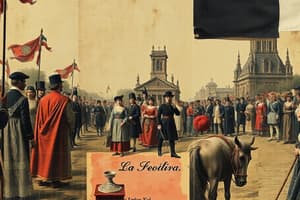Podcast
Questions and Answers
How did the division of French society into the Three Estates contribute to the French Revolution?
How did the division of French society into the Three Estates contribute to the French Revolution?
The vast inequality and privilege enjoyed by the First and Second Estates, while the Third Estate bore the brunt of taxation and had limited rights, fueled resentment and a desire for change.
Explain the significance of the Estates General in the lead-up to the French Revolution.
Explain the significance of the Estates General in the lead-up to the French Revolution.
The Estates General, convened to address France's economic crisis, provided a platform for the Third Estate to voice their grievances and demand reforms, ultimately leading to the formation of the National Assembly.
Describe how taxation policies in pre-revolution France affected the different estates and contributed to the revolution.
Describe how taxation policies in pre-revolution France affected the different estates and contributed to the revolution.
The Third Estate faced heavy taxation, while the First and Second Estates enjoyed exemptions, leading to resentment and demands for fairer distribution of the tax burden.
What were the key factors that led to the Reign of Terror during the French Revolution?
What were the key factors that led to the Reign of Terror during the French Revolution?
How did the execution of King Louis XVI impact the course of the French Revolution and subsequent events in Europe?
How did the execution of King Louis XVI impact the course of the French Revolution and subsequent events in Europe?
Describe the major differences in living conditions between the nobility/clergy and the common people before the French Revolution.
Describe the major differences in living conditions between the nobility/clergy and the common people before the French Revolution.
In what ways did the French Revolution contribute to the rise of Napoleon Bonaparte?
In what ways did the French Revolution contribute to the rise of Napoleon Bonaparte?
Explain how principles such as liberty, equality, and fraternity, which emerged from the French Revolution, impacted the reshaping of the nation's identity.
Explain how principles such as liberty, equality, and fraternity, which emerged from the French Revolution, impacted the reshaping of the nation's identity.
Flashcards
The Three Estates
The Three Estates
The social structure of France divided into three groups: clergy, nobility, and commoners.
Taille
Taille
A land tax in France that burdened the common people, contributing to unrest.
Estates General
Estates General
A representative assembly of the three estates convened to discuss economic issues in 1789.
Reign of Terror
Reign of Terror
Signup and view all the flashcards
Execution of King Louis XVI
Execution of King Louis XVI
Signup and view all the flashcards
Social Inequality
Social Inequality
Signup and view all the flashcards
Consequences of the Revolution
Consequences of the Revolution
Signup and view all the flashcards
Liberty, Equality, Fraternity
Liberty, Equality, Fraternity
Signup and view all the flashcards
Study Notes
The French Revolution: Causes, Events, and Consequences
-
The French Revolution was a period of major political and social change in France, marked by challenges to the existing social order.
-
French society was divided into three estates: clergy (First Estate), nobility (Second Estate), and commoners (Third Estate).
- The First Estate (clergy) were exempt from most taxes.
- The Second Estate (nobility) were also largely exempt from taxes.
- The Third Estate (commoners), including peasants and the majority of the population, bore the brunt of taxation.
-
Heavy taxation, especially the "Taille" (land tax), strained the resources of the Third Estate.
-
The Estates General, a representative body, was convened in 1789 by King Louis XVI to address the growing crisis.
- The Estates General consisted of representatives from all three estates.
-
Causes of the Revolution included:
- Poor harvests and rising bread prices
- Desire for social change: The Third Estate demanded equality and an end to the privileges of the nobility and clergy
The Reign of Terror
- The Jacobins, a radical group, gained power during the National Convention.
- The Jacobins initiated the Reign of Terror, a period of violent repression.
- Severe punishment was given to those who opposed the revolution.
- King Louis XVI was executed for treason in 1793. This occurred after his failed escape attempt to regain power.
Living Conditions Before the Revolution
- Pre-revolutionary France had significant disparities between the Estates.
- The nobility and clergy enjoyed privileges and exemptions from taxes, while the common people faced heavy financial burdens and social inequality.
Consequences of the Revolution
- The French Revolution led to the rise of Napoleon Bonaparte.
- The monarchy was abolished.
- The principles of liberty, equality, and fraternity became central to the French nation.
- The revolution significantly reshaped the political and social landscape of France and inspired similar movements elsewhere.
Studying That Suits You
Use AI to generate personalized quizzes and flashcards to suit your learning preferences.




